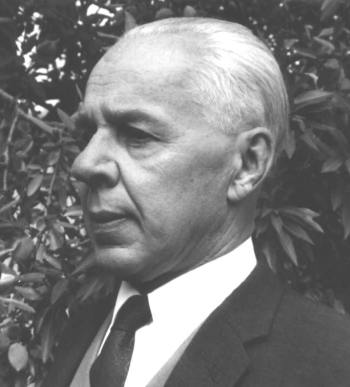
Pulgis Andriušis. Photo by Gediminas Andriušis
To commemorate 100 years since his birth in 1907, the Friends of the Lithuanian Club Library group in Sydney organised a literary afternoon on 18th November 2007. Mrs Elena Jonaitis introduced the writer and his works to the audience. Readers read extracts from six major works, which were complemented with piano pieces, chosen and played by Dr Ramutis Zakarevičius. It was a very successful and greatly appreciated literary afternoon. Below we have a translation Mrs E. Jonaitis introduction to Andriušis works and persona. This is followed by the recollections of her father by Laisvė Andriušytė - Daugalis, daughter of Pulgis Andriušis.
Elena Jonaitis - Introduction to Andriušis Works and Persona
We have gathered here to remember Pulgis Andriušis who was born 100 years ago in the Aukštaitija region of Lithuania and who died and was buried in Adelaide, 37 years ago. He left us an armful of books, which reveal a first class Lithuanian writer in exile, who has been awarded 3 literary prizes and who has been an attentive chronicler of everyday events. With biting humour, but without malice, he depicted quite ordinary people and small everyday events. At the same time he was also a creator with a poetic soul, a master stylist who could lyrically evoke the no longer existing Lithuanian village life in the Aukštaitija of the last century, where amongst glittering lakes, blooming meadows, hills and hillocks lived for ages at the same places well established, tranquil, diligent people. They grew wheat, told stories and legends. Such village life the writer experienced in his childhood. He kept its memory all his life and wrote about it in his books.
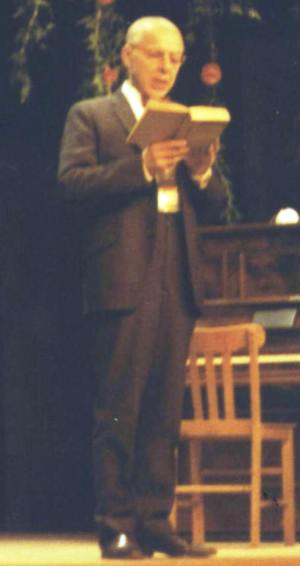
Pulgis Andriušis reading his works
His later life was so diverse and adventurous that his memoirs, entitled Septinton įleidus (On being seventy years old), is like an interesting novel. I will only mention the most significant points in his life.
When he had finished the junior high school in Utena, Pulgis Andriušis moved to Kaunas and was accepted at the "Aušra" high school. He lived again in a student boarding house. In the afternoons he went to Art School. He became known for his articles and drawings in a student newspaper. He also became notorious for his youthful waggishness. Having failed his matriculation examinations, he enrolled in the afternoon high school for mature age students. When he successfully finished it, he enrolled in the Kaunas University and for some time continued to study at the Art School. At the same time he became a member of the popular Esperanto Movement. Furthermore, he learned concurrently several foreign languages and began to translate Cervantes Don Quixote from the Spanish original. Andriušis began writing media reviews, feuilletons and even drew cartoons. He befriended writers, artists and actors. His mainstay earnings came from short translations, but he also designed book covers, posters and was an extra at the State Theatre and reader at the Radio Station Lithuania. In 1934 he got a permanent position on the editorial board of the newspaper The Lithuanian Traveller and moved to Klaipėda, where he lived until the Hitler putsch in 1939.
Lithuanias tragedy - Soviet Russian and Nazi German occupations - Andriušis experienced in Kaunas. By then he was married and had a family. He didnt wait for the third invasion (the return of Soviet occupiers). Like many other compatriots, he and family fled to the West. After the war they lived in the French zone. When the migration question arose, he chose Australia.
It must be highlighted that these times were the writers most creative period. The dismal life in the camps was relieved by his capacity to mock the environment and himself. Life overseas, with its ensuing troubles, hardships of building an existence, were relieved with descriptions of Lithuanias beauty and clear skies.
When the writer and his family were living in Adelaide, South Australia, six of his books were published, namely:
- The short story - Sudiev, kvietkeli (Good-by, little flower). Awarded a prize by the emigrant Lithuanian Writers Association.
- A humorous novel - Tipelis (The character).
- A feuilleton collection - Daina iš kito galo (A song sung backwards)
- The narrative - Rojaus vartai (The gate of paradise). Awarded the prize of the emigrant Lithuanian Writers Association.
- Short Stories - Purienos po vandeniu (Marsh marigolds under water).
- Rinktiniai Raštai (Outline of selected writings - includes the draft autobiography Septinton įleidus).
- Humorous short story - Ir vis dėlto juokimės (Let us laugh, nevertheless).
- Humorous short story - Siuntinėlis iš Amerikos (A package from America).
- A childrens story - Vabalų vestuvės (Insect wedding), and
- Collection of short stories - Anoj pusėj ežero (On the other side of the lake). This is one of his outstanding lyrical works, awarded the Lithuanian Red Cross prize.
While in Germany he also wrote four books:
(For more information on Andriušis books, please see the section Culture/Literature/Publications in Lithuanian on this website)
"The prize was awarded to Pulgis Andriušis for the short story Sudiev, kvietkeli in which
he described with deep knowledge and love Aukštaitijas traditional village life and the soul of its people. In the book
he has gathered the riches of Aukštaitijas dialects and with great erudition has created colourful episodes."
Translated by Isolde Poželaitė - Davis AM
Recollections of my Father
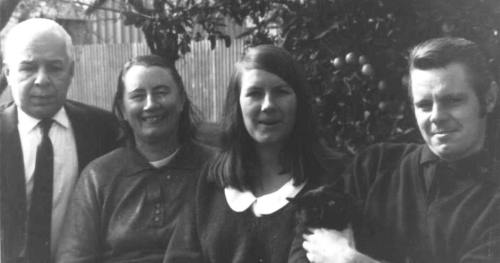
Pulgis with his family in Adelaide. Photo by Gediminas Andriušis
We left Lithuania in 1944, like many others, because it no longer was a safe place and father felt that with a young family in tow it was the better option. The Soviets regained control for the second time in four years in 1944. They had expelled the Nazis, who also had repressed and persecuted Lithuanians. Fathers career as a writer could not flourish under Soviet rule. It was beginning "to come together" for him and he naturally wished to establish himself in this career. He needed the freedom and stimuli to follow this path.
We lived during 1944 - 1949 first in Tübingen, then in Trossingen, in refugee camps and I believe that I barely started school in Germany. Father was making new contacts with other writers, poets, various artists and many exiles like himself. He was also involved in the publication of and wrote articles for "Dievo paukštelis". His life was centered on this literary scene. Further, he visited many of the Lithuanian "colonies" in the French and U.S. zones, where together with other writers like St. Santvaras, A. Gustaitis, B. Brazdžionis, arranged and put together various literary evenings, concerts, with as much new material as it was possible to produce in a short time. Father also published an Esperanto language booklet, as well as a Lithuanian - Spanish dictionary.
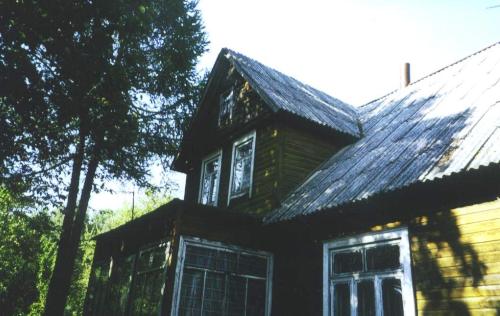
The Andriušis family home in the village of Gaidžiai in Lithuania.
Photo by Pulgis grandson Dikson Beattie
Photo by Pulgis grandson Dikson Beattie
In Australia, father had to fulfill a two year contract wherever the Government sent him. He was sent by the NSW Railways to clean railway carriages for those two years. Father never stopped writing! He was still writing his impressions of his trip to Australia and sending them to his publisher in Germany. In 1951 he wrote the short story Sudiev, Kvietkeli and he started sending articles to Mūsų Pastogė (a Sydney Lithuanian weekly newspaper). He also travelled to Melbourne and Sydney for literary soirées. I cant recall a time when he wasnt getting ready for such an event, of ever not wanting to go, or even turning down an invitation.
In 1968 he toured the U.S. and Canada, where he was literally rushed off his feet by such soirées, having to prepare for these events himself. He was travelling from one city to the next and also paid a visit to Las Vegas. This was a very hectic time for him and unfortunately his health was not the best even then. He returned exhausted. While in the States, he, together with St.Santvaras, A.Gustaitis and B.Brazdžionis, made an LP record, each reading an excerpt from his own work.
What works did he write in Germany and in Australia? In Germany he wrote humourous sketches about the life of Lithuanians in Western Germany: Ir vis dėlto juokimės in 1946; Siuntinėlis iš Amerikos in 1947 and a story for children Vabalų vestuvės in 1948. In Australia he wrote the short story Sudiev, kvietkeli in 1951. This book was published by Australijos Lietuvis in Adelaide. It was the first book, and first original work, to be published by the above. It won a prize for literature of Aus $1.500, donated by the Emigrant Lithuanian Writers Association. The
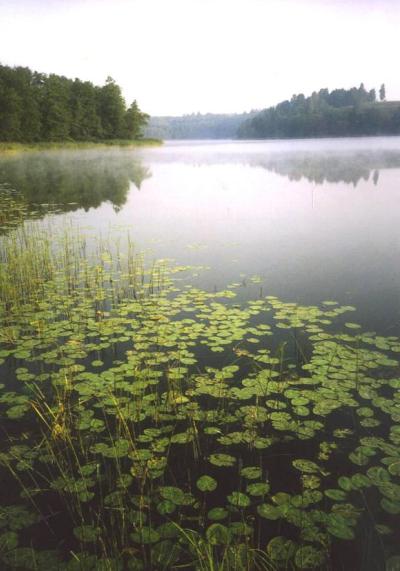
The Silys lake near Pulgis home in Gaidžiai.
Photo by Pulgis grandson Dikson Beattie
Photo by Pulgis grandson Dikson Beattie
My favourite work of father is Vabalų vestuvės. I feel it captures the very essence of "country life". I enjoyed the detailed characterization, humour, its charm. The illustrations by P.Osmolskis are delightful! In this book its as if one can feel fathers presence...
If father wasnt busy writing, he had lots of visitors calling to ask him to correct something they had written, or to help with the writing of it. Sometimes they asked for his opinion on something they had created etc. Many visitors, of course, merely sought his company. Then the high points would be when people like Rūtenis (a soloist and member of the Sydney Opera House choir), or other artists like Mr and Mrs Gučiai, or Mr Kazokas, visited us. I remember vividly when we lived in our first house in Bowden/Adelaide; we had a large kitchen, large enough to seat the whole Lithuanian choir of Adelaide. So father would invite them all. Mother would prepare what we would to call a banquet by todays standards. She baked the most delicious cakes. She also took care of us three children.
The household was run by mother. She took care of all things domestic - had to get things repaired when needed. Father wasnt a handyman and had no use for any electrical gadgets. He was never interested in driving a car either. So we learned to drive a car. Mother and father had jobs outside home as well. Father worked in the telegram home office at the then GPO. His all male office attendants couldnt pronounce his name Pulgis - so they called him Andy instead. Mother was teaching at a primary school.
We all enjoyed our garden. Father even planted some tobacco plants once, but it wasnt a success. Fathers philosophy was that Nature took care of itself. Most of the work was done in the garden by mother and my brother Gediminas. All in all, father encouraged us three to read widely (Dickens, Shakespeare), study languages, enjoy travel ... to stay with the Arts.
Laisvė Andriušytė - Daugalis, Adelaide, 2007.12.08 as told to Isolde Poželaitė-Davis AM